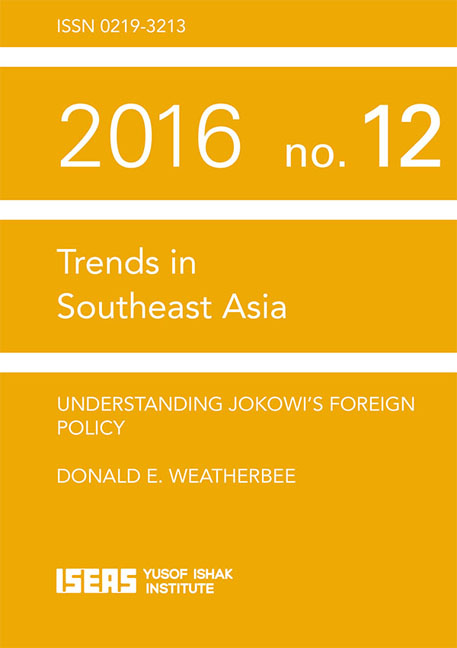Understanding Jokowi's Foreign Policy
Published online by Cambridge University Press: 09 March 2019
Summary
On 19 October 2014, Joko Widodo, known to all as Jokowi, was inaugurated as Indonesia's seventh president. He had no personal, career, class, or political ties to the outgoing administration and was viewed by the policy-making establishment as a newcomer lacking the attributes considered necessary to lead the country. Concerns were voiced about the future directions and constancy of Indonesian foreign policy. More directly, would term-limited President Susilo Bambang Yudhoyono's outward-looking internationalism be replaced by Jokowi's inward-looking nationalism? Now, approaching two years into Jokowi's term of office, it is appropriate to essay preliminary answers to these questions.
FOREIGN POLICY AND JOKOWI'S ROAD TO THE PRESIDENCY
President Jokowi was elected on 9 July 2014, defeating retired General Prabowo Subianto. The presidential candidates could not have been more different. Prabowo had followed a military career. Once commander of the army's feared Special Forces (KOPASSUS), he has a record of alleged human rights abuses which, if elected, would have made him unwelcome in liberal democratic countries. He is a former son-in-law of President Suharto and a staunch defender of the Suharto government when it was toppled in 1999 and Indonesia's democratization began. Jokowi came to office from a Central Javanese middle-class socio-cultural stratum with no roots in Indonesia's pre-democracy political history. Before entry into politics, he was an entrepreneur in a Surakarta (Solo)-based furniture manufacturing and exporting company. His political career began with him being the mayor of Surakarta [Solo] (2005–12), whose administration emphasized infrastructure, education, social welfare, and anti-corruption. Backed by the Indonesian Democratic Party of Struggle (PDI-P [Partai Demokrasi Indonesia-Perjuangan]), he was elected governor of Jakarta in 2012.
The new Jakarta governor was soon touted as a possible presidential candidate in 2014. The PDI-P is the political vehicle of former president (2001–04) Megawati Sukarnoputri, daughter of Indonesia's first president, Sukarno. Defeated twice for election to president by outgoing president Yudhoyono, Megawati still had her eye on the presidential prize. Polling showed that Jokowi was overwhelmingly preferred over Megawati. In the competitive atmosphere of an open presidential seat, Megawati had little choice but to anoint him as the party's flag-bearer if the PDI-P hoped to win the election. For both Megawati and Jokowi, it was a marriage of convenience, not of passion. Megawati made it known that she considered Jokowi beholden to her.
- Type
- Chapter
- Information
- Understanding Jokowi's Foreign Policy , pp. 1 - 71Publisher: ISEAS–Yusof Ishak InstitutePrint publication year: 2016



